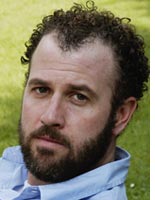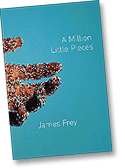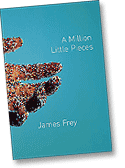
James Frey
 |
|
James Frey |
Long before his book was exposed as fraudulent, the James Frey phenomenon was itself Display A of what has become a deep-seated conviction of our therapeutic culture: Not only is the line between what is factually true and what is purveyed as "authentic" blurry indeed, but the inspirational power of a work of imagination or memory is the most relevant currency by which to judge its value. Frey's manuscript entered the market as a document whose fate rode more on its packaging than on the artistic merits of its prose, perception, or plot. He peddled Pieces to publishers as a novel, and, when that didn't work, he was content to sell it as memoir in the hopes of capitalizing on the allure of confessional revelation. He fancies himself a Writer—and has publicly dissed Dave Eggers and Jonathan Safran Foer—yet his fabrications seem dictated less by aesthetics (à la Truman Capote) than by a desire to tug ever more brutally on our heartstrings. And like any author, he knew that as soon as you go on Oprah, you're not promoting your book simply on its artistic merits, but on its claims to be an inspirational artifact.
 |
 |
|
"JT LeRoy" as "he" appeared in public |
From a purist point of view, LeRoy's initial foregrounding of his "autobiography" turned his fiction into a therapeutic object rather than a purely literary one from the start. While some writers might have been bothered by this, LeRoy actively invited this confusion. If it was impossible to extricate the horror of the author's experience from the accomplishment of the "fictional" work, all the better. Instead of being attacked, perhaps he ought to be celebrated for cannily playing the game his own way.
The fact is, doubts were raised about the accuracy of Frey's memoir from the start, both in reviews and in cocktail party chatter. And people have long believed that LeRoy was, in some fashion, the invention of another writer. So who is now shocked, shocked that dissembling is going on here? Not Doubleday, which continues to endorse its author. Not Oprah, if you caught her call-in during James Frey's exclusive interview with Larry King this week, to tell viewers that the "underlying message of redemption in James Frey's memoir still resonates with me, and I know it still resonates with millions of other people who will read this book." It was a perfectly scripted "unscripted" media moment. Her message summed up the reigning ethos, in which the once-opposed cultural vocabularies of therapeutic authenticity and postmodern subjectivity fuse: If a book moves you, it's true.
Ours, it seems, is a cultural landscape in which emotional "honesty" is alchemized into an artistic truth, and every reader gets to decide for himself whether the inherent artifice of the story matters to him—all while writers themselves cynically (and correctly) presume that most readers have no investment in what a purist might call "artistic merit" in the first place. We want to be surprised by the revelation of these fabrications, because if we were truly surprised, it'd mean that we care about truth in the first place. But in the end, it looks like the media hysteria is inspired less by our feeling "conned" by Frey and LeRoy, and more by a need for a cathartic public debate that will leave everyone feeling happy: a Salem witch hunt where no one is burned at the stake.
 |
A Man walks out on stage and Everyone starts clapping. I recognize the Man as a famous Rock Star who was once a Patient here. He holds up his arms in triumph and he smiles and he bows and his black leather is shining and his long, greasy black hair is hanging and his patterned silk shirt is flowing …
The Rock Star, Frey writes, describes how his meteoric success eventually led him to a dissolute life of drugs and booze:
He claims that at the height of his use he would do five thousand dollars of cocaine and heroin a day mixed with four to five fifths of booze a night and up to 40 pills of valium to sleep. He says this with complete sincerity and with the utmost seriousness. … Were I in my normal frame of mind, I would stand up, point my finger, scream Fraud, and chase this Chump Motherfucker down and give him a beating. Were I in my normal frame of mind, after I gave him his beating, I would make him come back here and apologize to everyone for wasting their precious time. After the apology, I would tell him that if I ever heard of him spewing his bullshit fantasies in Public again, I would cut off his precious hair, scar his precious lips, and take all of his goddamn gold records and shove them straight up his ass.
Both of these stock characters—the narcissistic, pretty-boy rock star suffering from a laughable lack of self-awareness and the world-weary anti-hero who is choking on the crap society is shoving down his throat—are typical of the kind of cliché-ridden portraits that populate Frey's book. There's Frey's one true love, a woman who was, naturally, "tall and thin and long and blond like the thickest silk her eyes blue eyes Arctic eyes." There are the small-minded, small-town cops, "fat stupid Assholes with mustaches and beer guts and badges." There's the book-smart, life-dumb drug counselor, a "grown-up version of a kid who spent his childhood sitting behind a computer hiding from bullies." If a novelist wrote a book run through with these kind of straight-from-Central-Casting chestnuts, he'd be politely told to try again … as Frey says he was, by 17 different publishers, before, Frey says, Doubleday's Nan Talese said she'd publish his novel if he recast it as a memoir.
But as just about everyone in America knows by now, courtesy of a careful investigation of his supposed grim exploits conducted by the Smoking Gun, Frey's book turns out to be just that, fiction. Or as Frey himself might put it, A Million Little Pieces is a compendium of "bullshit fantasies" about a life few of its readers have experienced, one redolent with crack binges, alcohol-fueled rages, violent outbursts, self-mutilation, multiple arrests, and several deaths. In Frey's telling, all of this culminates with the author's eventual self-willed recovery, which is presented as a hard-boiled inspiration for others. Frey's hardcover publisher, Doubleday, is still standing by a book that Oprah helped catapult to mega-bestsellerdom, proclaiming that "recent accusations against [Frey] notwithstanding, the power of the overall reading experience is such that the book remains a deeply inspiring and redemptive story for millions of readers." But by Frey's own calculus, those readers are in fact owed an apology—or at least an explanation.
Since one doesn't seem to be immediately forthcoming—last night on CNN's Larry King Live, Frey said he "stands by the book as being the essential truth of my life"—I'll take a crack at it. Late in Pieces, Frey writes about crippling ear infections he suffered from as a child (a claim the Smoking Gun has not contested). Improperly diagnosed, Frey writes that he spent the first years of his life in pain, literally screaming, until at age 2, a new doctor realized what was wrong, thereby beginning a round of operations that eventually fixed the problem. As a Hazelden counselor tells Frey, "If those screams went unheeded, whether consciously or unconsciously, they might have ignited a fairly profound sense of rage within you."
Frey, who by this point in his narrative is well-established as a stubborn iconoclast who insists on dealing with life on his own, Cool Hand Luke-like terms, won't bite. "I just won't let myself be a victim," he writes.
People in here, people everywhere, they all want to take their own problems, usually created by themselves, and try to pass them off on someone or something else. … I'm a victim of nothing but myself, just as I believe that most people with this so-called disease aren't victims of anything other than themselves. … I call it being responsible. I call it the acceptance of my own problems and my own weaknesses with honor and dignity. I call it getting better.
It is sentiments like this that have made Frey into a folk hero and Pieces into one of Winfrey's most popular book-club selections ever. He even boiled down his philosophy into a pithy, two-word motto—"Hold on"—which his acolytes have made into T-shirts and had tattooed on their bodies. (It's catchier than the motivational abbreviation* Frey has tattooed on his own arm: FTBSITTTD, for "Fuck the bullshit, it's time to throw down.")
Based on all the evidence, it seems Frey's weird, macho fear of seeing himself as a "victim" led him to fabricate a life that was painful and extreme enough so as to explain the sadness and despair he felt. Instead of a crack-binging street fighter, ostracized by both his peers and society, the Smoking Gun investigation indicates Frey was more likely a lonely, confused boy who may or may not have needed ear surgery as a child and felt distant from his parents and alienated from his peers. He drank too much, did some drugs, got nailed for a couple of DUIs and ended up, at age 23, in one of the country's most prestigious drug-and-alcohol treatment centers. When Frey writes that, after one of his fictitious arrests, he hated himself, saw no future, and wanted to die, I believe him. I grew up in a well-off suburban household with loving parents and no clear traumas in my past. I was popular enough in high school, I joined the newspaper and acted in plays, and I got into a good college. I was also miserably, sometimes almost suicidally, depressed, and, from the age of 15, I was taking drugs and drinking almost every day. Frey must have felt that his real, very scary, and very lonely feelings would have seemed weak if it was only preceded by standard-issue suburban teenage angst.
This isn't unusual. In rehab—I attended somewhere between a half-dozen and a dozen in-patient facilities—it's fairly standard for new patients to begin their stays by boasting of their fearlessness, their criminal bona fides, their extreme debauchery. I used to brag of my own rap sheet. I'd elide over the fact that my two arrests resulted in no convictions. And I certainly didn't offer up that my first arrest occurred after a remarkably inept attempt to break into a high-school classmate's house was foiled when his mother returned home and found my car parked out front (I referred to that as a "b&e with intent to commit a felony"), or that the second arrest was the result of my pilfering underwear and some light bulbs from my college's bookstore.
For most people, the insecurity and fear that lead to these type of exaggerations needs to fade away before they can really start trying to figure out how to go about fixing what went wrong with their lives. One counselor at an in-patient facility I attended used to publicly humiliate new patients on their first day in the program by first making them tell the group what brought them there and then quizzing them on the specifics—how many CC's does a standard syringe hold?—until they crumbled and started telling the truth.
But why should we care that Frey seems incapable of this? Beyond being slightly infuriating—Frey has made millions of dollars off of Pieces—what's the real-world impact of Frey's fakery? Oprah might feel a bit foolish, and presumably at least some of the 3 million-plus people who bought Frey's book will feel ripped off, but that in itself is not cause for any serious outcry.
Unfortunately, because A Million Little Pieces—one of the best-selling books about drug addiction ever written—has been trumpeted as an unflinching, real-life look into the world of a drug addict, it has helped to shape people's notions about drug abuse. Ironically, the very abundance of its clichés has likely helped make it a runaway best seller: People, after all, like having their suspicions confirmed. For nonaddicts, Pieces reinforces the still dangerously prevalent notion that it's easy to spot a drug addict or an alcoholic—they're the ones bleeding from holes in their cheeks or getting beaten down by the police or doing hard time with killers and rapists. For those struggling with their own substance-abuse issues, Pieces sends the message that unless you've reached the depths Frey describes, you don't have anything to worry about—you're a Fraud. And if you do have a problem, you don't need to necessarily get treatment or look to others for support; all you need to do is "hold on." In building up a false bogeyman—the American recovery movement's supposed reliance on the notion of "victimhood"—Frey has set himself up as the one, truth-telling savior. In fact, it seems clear that Frey would have been well-served by taking the kind of unflinchingly honest look at his own life that most recovery programs demand.
*Correction, January 12, 2006: This story originally and incorrectly referred to James Frey's motivational tattoo (FTBSITTTD) as an acronym. In fact, as those letters do not form a word, it is only an abbreviation. Click here to return to the corrected sentence.